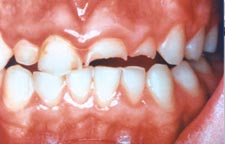What is tooth erosion?
 Many people confuse tooth erosion with tooth decay even though the symptoms and causes are very different. Tooth decay occurs when acid is produced by the bacteria in the mouth (plaque), feeding on the carbohydrate in the diet. Its effect is quite localised.
Many people confuse tooth erosion with tooth decay even though the symptoms and causes are very different. Tooth decay occurs when acid is produced by the bacteria in the mouth (plaque), feeding on the carbohydrate in the diet. Its effect is quite localised.
Erosion occurs across the whole tooth surface and does not involve bacteria or dietary sugars but is the result of the direct action of acids on tooth enamel (tooth hard tissues). These acids can come from the diet (e.g. from yoghurt, pickles, soft drinks) or occasionally from gastric acid (e.g. from acid reflux) or even more occasionally from the environment (e.g. from chlorinated swimming pools).
Combined with attrition (wear between biting surfaces) and abrasion (wear of the tooth surface through excessive rubbing), erosion can cause ‘tooth wear’, when hard tissue such as dentine and enamel is lost.
How many people suffer from tooth erosion?
In the National Diet and Nutrition Survey: Young People aged 4 to 18 years.
- Over half of the young people (aged four to 18) showed signs of tooth erosion
- 46% of four to six-year-olds had erosion in their milk teeth. For 12% of these, the erosion had spread to the dentine and pulp of the tooth
- 34% of 15 to 18 year-olds examined were suffering from tooth erosion, with 5% showing signs of extensive damage
- Young people in the Northern region aged 7 to 18 years were significantly more likely to have an experience of erosion than those in London and the South East.
In a study of British 14-year-old school children
- 51% of 14 year-olds examined showed evidence of tooth erosion
Erosion is an increasing concern for both adults and children. Milk teeth have thinner enamel and dentine layers than adult teeth and these are worn away more quickly by contact with acid – the main cause of tooth erosion. Usually these are extrinsic acids – from food and drink, and sometimes intrinsic – from within the body e.g. stomach acid.
Who is at risk?
- Anyone who drinks excessive amounts of fizzy drinks or fruit juices. These drinks have a high acidity that can dissolve tooth enamel. And the way drinks are consumed can also make a difference too – keeping the drink in the mouth for a long time or swishing it around the teeth accelerates the erosion. This is thought to be a major cause of tooth erosion
- People with eating disorders such as bulimia often suffer from tooth erosion as frequent vomiting causes tooth damage from stomach acids
- Erosion can also be seen in people suffering from a hiatus hernia because they have a frequent reflux of gastric acid into the mouth. This can also be a problem for people who suffer from chronic indigestion or heartburn
How do I reduce the risk of tooth erosion?
- Drinking milk and water reduces the risk of tooth erosion if consumed instead of acidic drinks
- Acidic drinks should be drunk quickly
- Do not brush your teeth immediately after taking an acid drink as this is when the enamel is soft
Other Dental Treatments
After years of anxiously neglecting my teeth, I took the plunge to see Dr. Rainsberry. She’s very caring and compassionate, gentle and human! Does a great job – I have recommended the surgery to my support group for autistic people who also struggle in medical environments. I will be a repeat visitor until my teeth are at optimum.
Dr Martin Edwards is a brilliant a very patient dentist I would recommend him to anyone.
Went for a tooth extraction, then 2 weeks later a hygiene clean… Both was amazing services.. Lovely staff… My teeth are feeling and looking better than other 😊.
Great service new what I was going to pay and a great job done and great friendly service from the reception to the dentist and his nurse.
